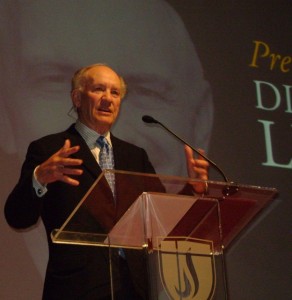The newly formed Prentice Meador Distinguished Lectures began on Tuesday with Landon Saunders from Heartbeat Ministries speaking in Willard Collins Alumni Auditorium at Lipscomb University.
The lecture series showcases speakers who exemplify effective Christian ministry, as Meador did throughout his career.
Saunders, a Lipscomb graduate and personal friend of Meador, founded Heartbeat Ministries, a faith-based nonprofit organization that aims to show people that they can live a joyous life regardless of circumstance.
Through Heartbeat Ministries, Saunders targets young people between the ages of 18 and 29, an age group that Meador believed in and constantly reached out to.
“He may be from your parents’ generation, but he’s doing so much for your generation,” President Randy Lowry said in his introduction of Saunders.
Saunders spoke of his experience with young people who had stopped going to church and the reasons they stopped. A common strain of answers Saunders received pertains to the nature of the church as an assembled group.
One primary area of focus in Saunders’ address was about the overemphasis of time spent in the church, which Saunders calls “assembled time.” Saunders stressed how the way we act outside of church assembled, which he calls “church unassembled,” is far more vital as is an unlimited amount of time.
“Maybe we have this conception of church, that it only occupies three hours on a Sunday morning,” Saunders said. “And most people’s conception of church is based on that three hours.”
Saunders said this assembled church can be a potentially negative thing because of some churches’ homologous and sometimes exclusive nature.
“No one needs to tell us how much time we spend on the church assembled,” Saunders said. “But how much time have we spent on the church unassembled? The part where every single one of us spends the most of our lives is church unassembled.
“Is it possible that any problem that people are having with religion is maybe not exclusively what we do when we are assembled, but maybe it’s also what we do when we are not assembled?”
“Superman goes into a phone booth to change into a superhero,” Saunders said. “But is the story of Superman about a phone booth or a janitor’s closet? In the same manner, we must put more emphasis on the way we are in church unassembled than inside the actual building.”
The following audio slideshow was produced by Lumination Network reporter Hunter Patterson.


